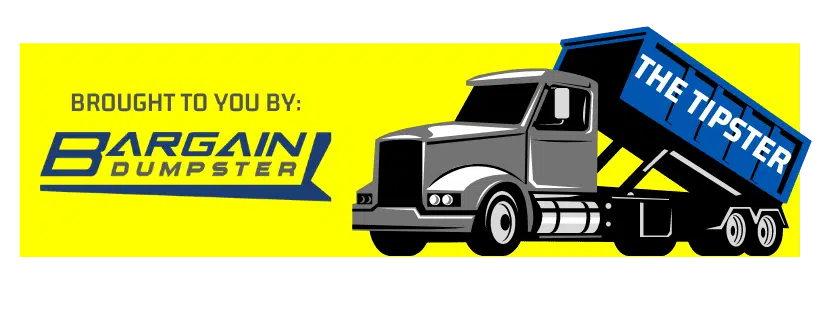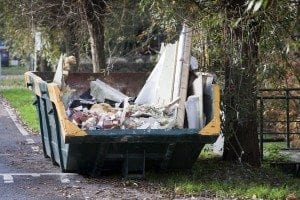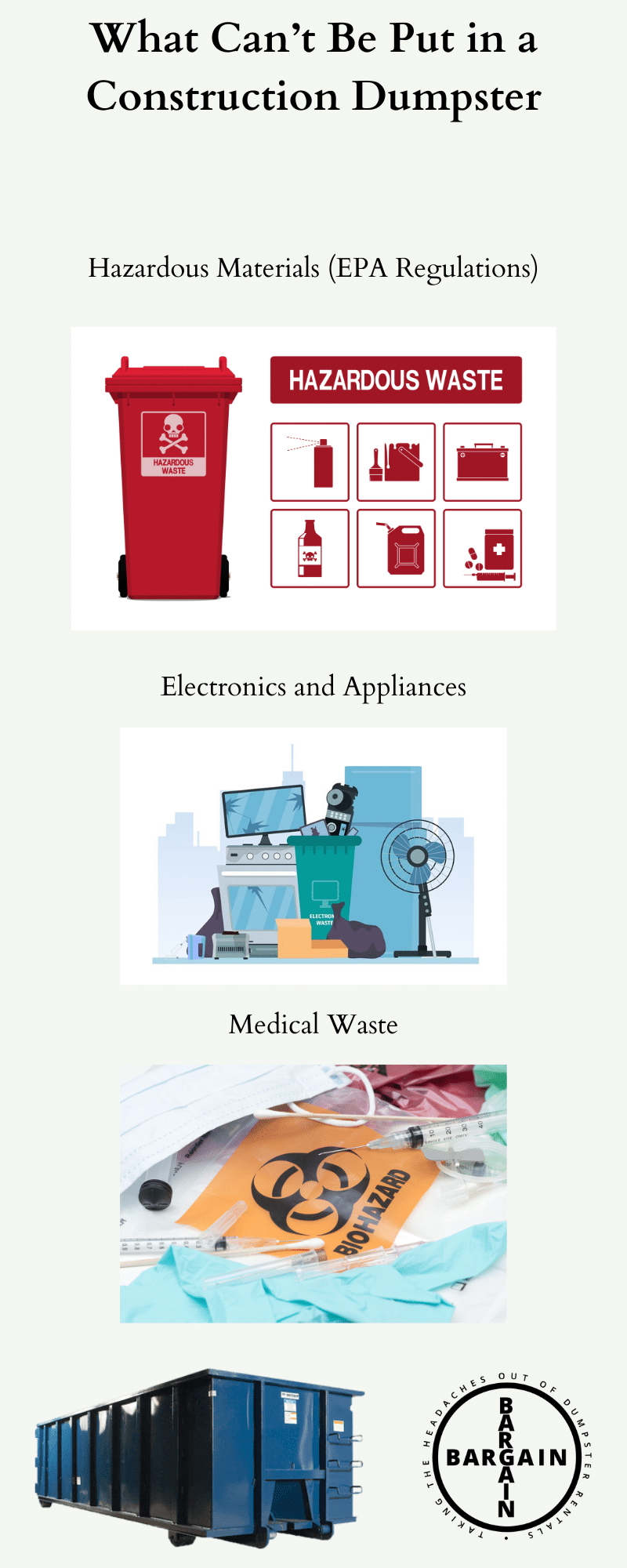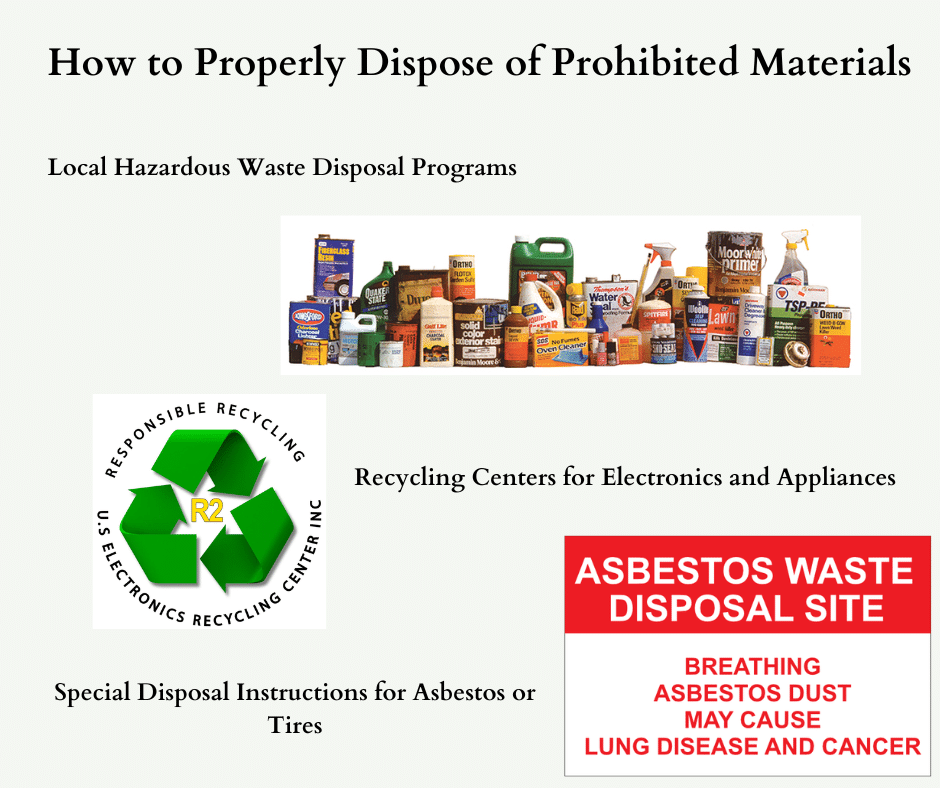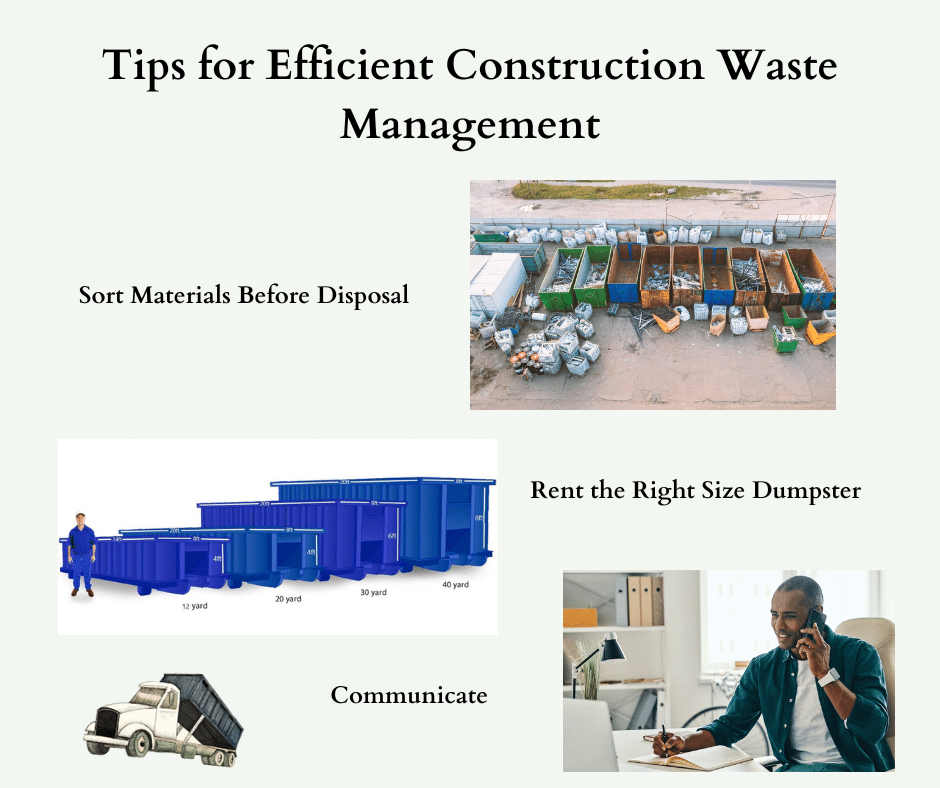So What Can be Placed in my Construction Dumpster
When starting a construction project, having a dumpster on-site can make cleanup quick and easy. Whether you’re tearing down walls, installing new floors, or working on a full renovation, a construction dumpster is a convenient way to manage debris. However, not everything can be tossed into these dumpsters. Knowing what’s allowed and what’s prohibited is key to keeping your project on track.
Improper disposal can lead to unexpected fines, harm the environment, or even cause delays in your project. That’s why it’s essential to follow the rules when filling your dumpster. By doing so, you’ll avoid any surprises and ensure a smooth cleanup process from start to finish.
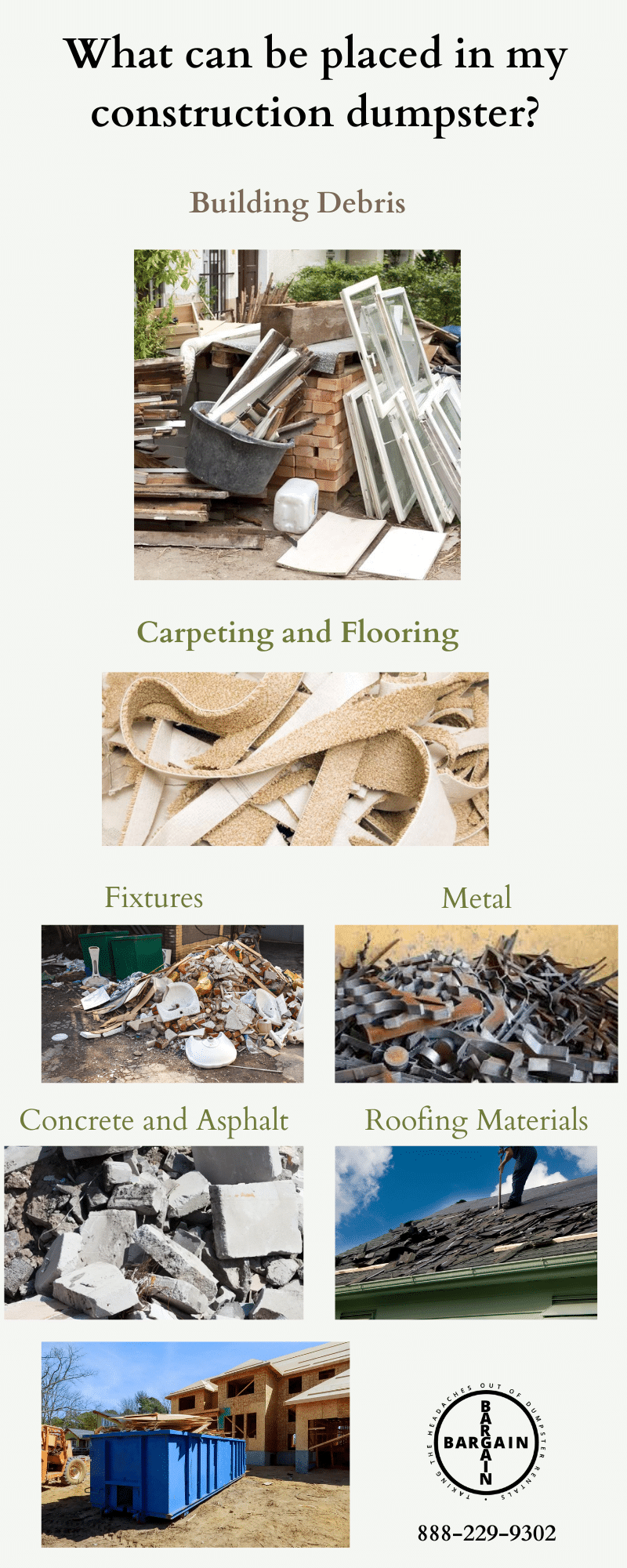
What can be placed in my construction dumpster?
When tackling a construction project, it’s important to know what materials you can safely toss into a dumpster. Luckily, most common construction debris can go right in, making cleanup a lot easier. Here’s a rundown of what you can put in your construction dumpster:
Building Debris
You can toss out most general building materials like wood, drywall, and plaster. These are some of the most common items left over from renovations and new builds.
Metal
Construction dumpsters can handle metal scraps like pipes, rebar, and other smaller pieces of metal. Just be sure to avoid any large appliances or electronics, as these may need special disposal.
Concrete and Asphalt
If you’re tearing up a driveway, sidewalk, or other hard surfaces, you can dispose of concrete and asphalt in your dumpster. Keep in mind that these materials are heavy, so make sure you’re not exceeding your dumpster’s weight limit.
Roofing Materials
Old shingles, tiles, and flashing from a roofing job can be safely thrown into your construction dumpster. Whether you’re doing a small roof repair or a full replacement, dumpsters are a great way to handle the debris.
Carpeting and Flooring
You can also dispose of old carpet, tiles, vinyl, and laminate flooring. If you’re updating the flooring in a home or office, a dumpster makes getting rid of the old material quick and easy.
Fixtures
As you upgrade a space, you may need to throw out old doors, windows, cabinets, and sinks. All these fixtures are allowed in a construction dumpster, keeping your project site tidy and organized.
Pro Tip: Construction dumpsters come in different sizes to fit your project needs. Smaller dumpsters are great for home renovations, while larger ones are better for commercial or full-scale construction jobs. Make sure to choose the right size to avoid unnecessary trips or added costs.
What Can’t Be Put in a Construction Dumpster
When using a construction dumpster, it’s important to know what materials can’t be tossed in with regular debris. Certain items are restricted for safety, environmental, or legal reasons. Let’s break down the most common things that you shouldn’t put in your dumpster:
Hazardous Materials (EPA Regulations)
Hazardous materials are restricted by the Environmental Protection Agency (EPA) because they can harm the environment and human health. These include:
- Asbestos: This material is found in older homes and buildings, especially in insulation. Because of its dangerous health risks, licensed professionals must dispose of asbestos.
- Chemicals: This includes things like paints, solvents, and cleaning agents. Many of these chemicals are toxic or flammable and can’t go in a dumpster. Check with your local hazardous waste facility for safe disposal.
- Batteries: Whether they’re small household batteries or car batteries, they contain chemicals that are dangerous when not disposed of properly.
- Tires: Tires aren’t accepted in most landfills because they take up a lot of space and can be harmful to the environment. You’ll need to recycle tires at a designated facility.
Electronics and Appliances
Items like TVs, refrigerators, and air conditioners are not allowed in most dumpsters. They often contain hazardous chemicals like Freon or must be recycled to protect the environment. Instead, check for local recycling programs or special disposal services for these items.
Medical Waste
Any kind of medical waste, from sharps to medications, cannot go in a dumpster. These materials require special handling to avoid contamination and exposure risks. Hospitals and local health departments often have programs for disposing of medical waste properly.
Large Quantities of Heavy Debris
While most dumpsters can handle heavy materials like concrete or asphalt, too much can cause the dumpster to exceed weight limits. Each dumpster has a weight capacity, and if you go over that, you could face additional fees. It’s a good idea to check with your dumpster provider if you plan to dispose of large amounts of heavy debris to avoid any extra charges.
By following these guidelines, you’ll avoid fines, protect the environment, and ensure your construction project runs smoothly.
How to Properly Dispose of Prohibited Materials
When working on a construction project, you’ll come across items that can’t be thrown in a regular dumpster. But don’t worry, there are safe and simple ways to dispose of these materials without breaking any rules or harming the environment.
Local Hazardous Waste Disposal Programs
Hazardous materials, like paint, cleaning chemicals, and certain types of batteries, need to be handled with care. Many cities offer local hazardous waste disposal programs where you can drop off these items safely. Check with your local government or waste management service for scheduled collection events or drop-off locations.
Recycling Centers for Electronics and Appliances
Old electronics, such as TVs, computers, and refrigerators, contain components that shouldn’t go in a dumpster. Instead, take them to a local recycling center that accepts electronic waste. Many centers also take large appliances, like stoves and air conditioners. Some stores even offer trade-in or recycling services when you buy a new device, making it easier to dispose of the old one.
Special Disposal Instructions for Asbestos or Tires
Materials like asbestos and tires require extra care. Asbestos is hazardous to your health, so it must be handled by a professional. Contact a local asbestos removal service to safely take care of it for you. Tires also shouldn’t be tossed in with your regular trash. Many tire retailers or auto shops will accept old tires for recycling, so check with a nearby service to get rid of them responsibly.
Consequences of Improper Disposal
Fines and Penalties from Municipalities or Landfill Sites
When you toss prohibited items into a construction dumpster, you could face fines from your local government or the landfill. Each area has its own rules, and breaking them can cost you. These fines add unnecessary expenses to your project, which no one wants.
Potential Harm to the Environment and Human Health
Improper disposal of hazardous materials, like chemicals or asbestos, can damage the environment. These substances may leak into the soil or water supply, causing harm to wildlife and people. Sticking to approved materials helps keep the environment safe for everyone.
Delays in Project Completion Due to Dumpster Issues
If your dumpster contains restricted items, it could lead to a major delay in your project. The dumpster rental company may refuse to pick it up until the issue is resolved. This can slow down your timeline, cause frustration, and even lead to extra costs if you need the dumpster longer than expected.
Tips for Efficient Construction Waste Management
Managing construction waste can be a challenge, but with a few simple tips, you can keep your project running smoothly and stay within budget. Here are three ways to manage waste efficiently while making sure you follow all the rules.
1. Sort Materials Before DisposalTaking the time to sort your materials before tossing them into the dumpster will save you a lot of hassle. Separate recyclable items like metal, cardboard, and wood from non-recyclable waste. Not only does this help the environment, but it can also reduce the weight of your dumpster load, which might save you money. Some recycling centers even accept certain construction debris for free, so it’s worth doing a little research!
2. Rent the Right Size DumpsterPicking the right-sized dumpster is key to managing construction waste efficiently. Too small, and you’ll need multiple hauls. Too big, and you might overspend. Estimate how much debris your project will generate and choose accordingly. For smaller renovations, like a bathroom remodel, a 10-yard dumpster should work. Larger projects, like roofing jobs or new builds, may require a 20- or 30-yard dumpster. Your dumpster provider can help you select the perfect size.
3. Communicate with Your Dumpster ProviderNot all materials are allowed in a construction dumpster. It’s essential to talk to your dumpster provider about any restrictions they may have. Certain items, like hazardous materials or appliances, may need special handling. By knowing what you can and can’t toss ahead of time, you’ll avoid any extra fees or delays.
By sorting your materials, choosing the right dumpster size, and communicating clearly with your provider, you can streamline your construction waste management. Keeping things organized from the start helps your project stay on track and stress-free.
ConclusionTo wrap things up, it’s important to know what can and can’t go into a construction dumpster. You can safely dispose of materials like wood, drywall, metal, and concrete, but hazardous items such as chemicals, asbestos, and electronics need to be handled separately. Following these guidelines will help keep your project on track, avoid extra fees, and protect the environment.
When in doubt, it’s always best to check with your dumpster provider. At Bargain Dumpster, we’re happy to answer any questions and help you choose the right dumpster for your job. Contact us today to get started!
-
Craig is one of the founders of Bargain Dumpster, established in 2015 with a simple goal — to make dumpster rentals easy, affordable, and reliable. With years of experience in waste management and business operations, Craig brings a practical perspective to every topic he writes about. His focus is on helping homeowners, contractors, and businesses find smarter, more efficient ways to handle cleanup projects of any size. When he’s not working, Craig enjoys staying active and spending time with his family and Golden Doodle Charlie.
